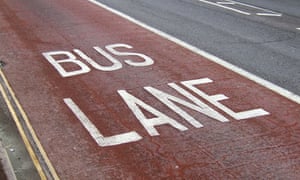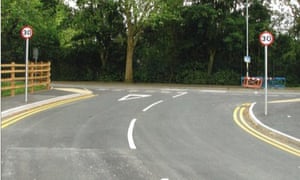
How dodgy signs on a tiny stretch of road in Manchester earned the town hall £24,000 from fines in 40 days
Bernard Pratt

More than 1,000 drivers travelling along one stretch of road in Manchester have been fined at least £24,000 in just 40 days because a bus lane had inadequate warning signs.
The opening of a new route on to the existing bus lane in Didsbury, south Manchester, resulted in the number of fines increasing from a "normal" rate of 200-300 in 40 days to more than 1,000, a Freedom of Information request has revealed.
I was one of the reluctant contributors to Manchester city council's windfall, and I feel I've been mugged by what John Harris recently called "the clunking fist of state power".
The exit from a newly-opened car park at the city's East Didsbury tram terminus forms a T-junction with a main road. When the terminal opened this summer, a bus lane was already on the far side. The solid white line was difficult for drivers to see as they approached the junction up a slope, and because the lane was on the reverse camber of the main road.

No sign: going up the slope of the East Didsbury tram stop car park exit to meet the bus lane at the top. Photograph: Bernard Pratt
There was no warning sign on the approach to the T-junction of any bus lane ahead, and no "repeater" sign for drivers to see once they had emerged on to the road.
The council claims that the bus lane was correctly marked. It certainly had a white line, and there were clear warning signs at the beginning of the lane, but crucially the signs were not visible to those joining the lane in the middle.
It is often a very busy junction, where drivers have to concentrate on traffic from both directions, just at the point where the white lane boundary came into view.
I wrote to the council complaining about the unfairness of fining drivers for "offences" they did not know they were committing. My protest accompanying my £30 fine called for a "Bus lane ahead" sign below the 30 mph sign next to the exit. I added: "Until such a sign is in place you should rescind the fines. I understand there have been quite a few since the car park opened. If you choose instead to continue with the present unfair arrangement, you play into the hands of those who see all fixed penalties as revenue-raising devices."
The council's only response to me was to cash my cheque. Its dubious bus lane was proving a nice little earner, and the council allowed the fines to continue rolling in. The lucrative bonanza period for the city council lasted several weeks. The bus lane has since been shortened, and now does not start until well after drivers have turned on to the main road and can see the new warning signs.
I waited a month for the council to reply, and concluded it must be official policy to ignore protests. I wrote again, complaining at the ill-mannered arrogance of such a policy. This letter was also ignored. I believe the council was hoping I'd give up. I had sent a cheque for the fine, not as an admission of guilt, but as insurance against having the fine doubled if my dispute was not resolved within 14 days.
I'm a supporter of bus lanes, and of the fines for infringement. But drivers need clear signs telling them where those lanes are. Unfair traps, like the Manchester example, give credence to the rhetoric of "the war on motorists" peddled by those who object to all bus-priority measures.
Unable to get the council to acknowledge me (apart from my chequebook), I sent a statutory Freedom of Information request for figures for the numbers of infringements at various times. I wanted to discover whether the opening of the car park without the warning signs was followed by a rise in the number of drivers straying into the bus lane. The figures showed that the "normal" rate of infringement was a little more than six a day. But once the new T-junction exit was in use, the rate went up to almost 27 a day. The figures meant that over 40 days the council's revenue from fines must have risen from about £7,530 to £32,280, assuming everyone paid up at once and did not incur a doubled penalty. Allowing for the "normal" rate, this seemed to show that the 40-day bonanza period gave the council an unexpected £24,000.
Councillor Kate Chappell, Manchester City Council's executive member for the environment, issued a statement in which she said all bus lanes in Manchester were clearly marked. She said I had paid my fine without challenging it through the council's appeal process. But she ignored the fact that I challenged the fairness of the fine, in writing, immediately after it was imposed. I then waited for the council to notify me of its verdict. And waited.
Councillor Chappell did not attempt to justify the city council's failure to tell me on what grounds they were rejecting the points I was making. Instead she stated: "This was neither a "bonanza" or [sic] a "windfall", as all money from bus lane fines is ploughed straight back into schemes which improve public transport in Manchester, such as the free Metroshuttle bus across the city centre."
This bare-faced non sequitur is about as relevant as an assurance from a mugger that he always gives the money he steals to a charity for rescued kittens. In any case, Collins Concise Dictionary defines a windfall as unexpected good luck, and a bonanza as sudden good luck or wealth – just what the council's public transport budget experienced last summer. I stand by my language, which is remarkably moderate in the circumstances.